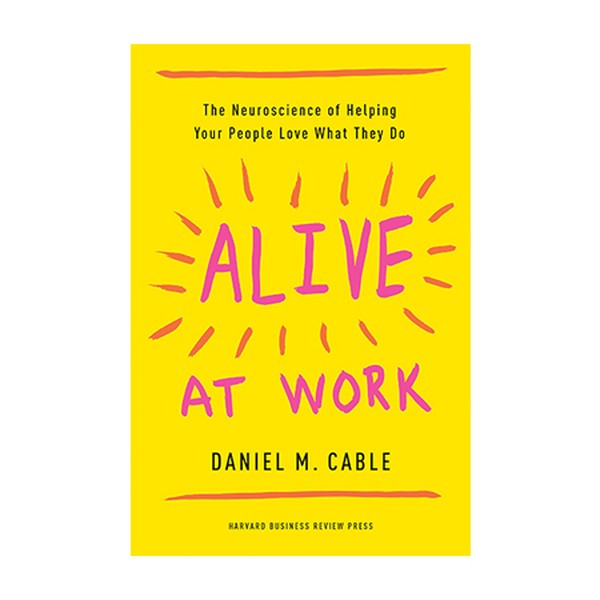How To Love Your Job, According To Science
We’ve all been there: yawning your way through another monotonous day of work, ready for that sweet, sweet 5pm release, only to look at the clock and realise it’s 9.10am and you’ve been in the office all of 20 minutes. (Thought you’d never see a gal drink 10 cups of coffee in two hours? Think again, my friend.)
There's always going to be days where you know you’re not working to your full capacity – Fridays, we’re looking at you – but it’s estimated up to a whopping 80% of the current workforce aren’t performing at their best on a regular basis, with 70% saying they’re just not feeling engaged. For anyone who’s worked in the stereotypical office environment the reasons are glaringly obvious - think hierarchal power, rigid rules, performance metrics and a lack of good office snacks - so it’s no wonder most employees aren’t reaching their full potential. But why do these aspects of working life have such an impact on our motivation?
In his new book, Alive at Work, Cable explains how attempts at routinising work are suppressing what neuroscientists call our ‘seeking system’. This part of the brain has a desire to explore our world, learn about our environments and extract meaning from our circumstances. And when we follow its natural urges, our brain releases dopamine, the neurotransmitter linked to motivation and pleasure. Insufficient dopamine means we’re less willing to work and plagued by poor performance.
Cable believes many of us are stuck in “ruts of efficiency” – the stage where it’s easier to keep doing things the way you’ve always done them. Essentially, you’ve got it solved and sorted, you know how to hit the metrics, so much so you could almost start mailing it in. But the psychologist warns when things start feeling routine, your enthusiasm could begin to plummet.
If this sounds all too familiar, keep reading. SL spoke to Dan Cable to discover his four-step plan for feeling happier, more motivated and truly alive in your job…
1. Discover Your Purpose
Ask yourself: What is the purpose of this job I care about and who am I affecting when I do this really well? Invest some energy and time into your answers. Think about the end users of your work and meet them one-on-one if possible to try and understand what it feels like to them when you do something well, and what happens when you don’t do something well? Ask them: “What are some of your needs that maybe I’m not addressing right now?”
In order to activate the seeking system, people need to feel purpose – it lights up our systems and gives us that jolt of dopamine. When we understand and believe in the ‘why’ of our actions, we also have greater resilience and stamina when the going gets tough.
2. Use Your Unique Strengths
There’s a saying: “The purpose of life to is find your gifts, and then give them away.” And using your strengths, as described above, is an easy way to make work feel more purposeful. In fact, employees who use their strengths every day are three times more likely to report having an excellent quality of life.
Think about your strengths and how you use them at work – could they be expanded on? Taking the bits of your job where you really flourish and expanding them is also known as ‘job crafting’. This sometimes allows you to negotiate out parts of your job not playing to your strengths and not lighting you up.
3. Find Freedom In The Frame
The seeking system doesn’t care what industry you operate in. It doesn’t care if you’re making washing machines, tires or selling insurance. It’s about experimenting with new ways of solving problems and finding resources.
It is possible for organisations to simply tell their employees to “Be free! Experiment! Do whatever you like!” and still be successful, however they still need employees to meet regulations – there has to be a ‘frame’. The secret is finding the freedom within that frame – try carving out a space in your schedule each day (whether it’s 20 minutes or an hour) for trying new ideas and new ways to improve things, utilising your unique strengths.
4. Speak Your Manager’s Language
An ‘old-school’ manager may not see the advantages of allowing people to play to their strengths, and often care more about control and compliance than innovation and engagement. If that’s the case with your manager, help them understand you’re willing to do extra work that makes you more effective. This way it won’t seem like you’re going against the traditional approach but saying instead: “I would like to invest my personal skills in this to improve its quality.” The conversation needs to be less about ‘me, me, me’ and more about job quality and output.
If the above approach still threatens your leader, then it’s probably is time to look for another job as it’s unlikely you’re going to thrive under him or her and you’ll be unable to do your best work or create an impact.
Alive at Work: The Neuroscience of Helping Your People Love What They Do by Daniel M Cable is out now (Harvard Business Review Press, £16.99)
DISCLAIMER: We endeavour to always credit the correct original source of every image we use. If you think a credit may be incorrect, please contact us at info@sheerluxe.com.



